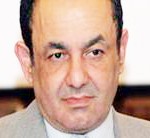As three days passed after the 24 August anti-Morsy protests were organised, columnists have continued to analyse the repercussions of the demonstrations. Some writers condemned the entire notion, while highlighting angles and reasons of failure, others praised the move describing it as one of the first successful trials of democracy and one of the most significant events since the presidential elections.
On another note, opinion pieces tackled President Morsy’s trip to Iran to attend the Non-Aligned Movement Summit, being the first Egyptian visit to the country since 1979. Despite the debates expected out of Morsy’s meeting with Ahmadi Nagad, several writers have expressed a wish that the journey would prompt the opening of a new page towards mutual healthy relations between the two countries.
After 24 August: where is the failure?
Amr Al-Shobaki
Al-Masry Al-Youm Newspaper

In an attempt to scrutinise the anti-Muslim Brotherhood protests that took place on 24 August, Amr Al-Shobaki states that the demonstrations have failed in the first democratic test hitting Egypt after the 25 January revolution. He believes that one of the first causes behind the malfunction of the call goes originally to describing it as a “million man’s march,” where as the actual number of demonstrators has not exceeded thousands. A second reason for the collapse of support for Mohamed Abu Hamed’s call is the negative reaction received by many political parties and movements towards the notion itself.
Although the demonstrations and its effects were meager, several political figures have fiercely attacked these meaningless protests. Al-Shobaki condemns how many have called the anti-Muslim Brotherhood protesters as disloyal and in extreme cases, infidels. Finally, the writer notes that the third failure of the 24 August protests materializes in the poor performance of the Ministry of Interior and its role in protecting the demonstrators. Revisiting the old days of the ousted National Democratic Party, the writer regards the violence accompanying the protests as reminder that brings the minds back to the dark 30 years of Mubarak’s despotic rule.
The Second Day
Mohamed Salmawi
Al-Masry Al-Youm newspaper

Delving again into the analysis of 24 August anti-Morsy demonstrations, Mohamed Salmawi sheds lights on the evident success marked in the protests. Despite the violence occurring in the first day and assaults directed to demonstrators allegedly by Muslim Brotherhood advocates, the writer notes that the second day has proven that the roots of the revolution are still intact. After almost two months since Mohamed Morsy’s presidency, Salmawi writes that Egyptians remain resolute on achieving change and expressing their opinions. In his estimation, anti-Muslim Brotherhood supporters have managed to reveal the true colours and fake strength of the once-banned group and deny their claims and accusations that liberals tend to set ablaze their headquarters.
One of the most remarkable achievements of 24 August demonstrations, according to Salmawi, is its ability to sustain its skeleton until now; where as protestors continue with their sit-in until his column has been published, at least. The demonstrations, as described by Salmawi, thrived to corner the Muslim Brotherhood and its illegitimacy. It has further confirmed that Egypt after the 25th of January revolution will not accept that the Islamist group would sit back relaxing away from laws and regulations. Wrapping up his column, Salmawi describes the 24 August demonstrations as “one of the most important events occurring in Egypt after the presidential elections”. For him, it has strongly proven the ability of Egyptians in holding its new leader accountable.
Morsy’s Four Hours in Tehran
Emad Al-Din Hussein
Al-Shorouk newspaper

Discussing Mohamed Morsy’s coming trip to Iran to attend the Non-Aligned Movement Summit, Emad Al-Din Hussein praises the president for taking a step that Egypt has refrained from since 1979. The visit, which will not prolong more than five hours, will probably end up as proper protocol trip. Hussein does not expect much to result from Morsy’s meeting with Mahmoud Ahmady Najad, but their picture standing beside each other will possibly ensue a set of repercussions. Egypt’s last visit to Iran was carried out by late President Anwar Sadat, before the Iranian revolution in February 1979. Since then, Sadat cut back on relations with Tehran and Mubarak followed his steps as per the U.S. and Israel request.
Morsy comes to move in the opposite direction aiming at establishing a relation of mutual interest and benefit. Hussein notes that Morsy’s opening of a new page with Iran is one of the most significant steps taken within the framework of Egypt’s foreign relations. Concluding his column, Hussein calls upon Morsy to reshuffle the sick heritage of ousted Mubarak and explore new horizons with Iran. He hopes that the short visit will succeed in building the corner stones of healthy relations between Egypt and Iran.
The Challenge of a Parliamentarian
Ibrahim Mansour
Al-Tahrir newspaper

In his column, Ibrahim Mansour argues that the once-banned Muslim Brotherhood group failed to cause any remarkable change since it has commenced climbing up the ladder of authority. The writer notes that even the minimal change that took place after the parliamentary elections, the Islamist group with its conservative identity could not mark any difference compatible with the dramatic changes hitting Egypt after the 25th of January revolution.
The uprising has erupted to achieve freedoms and social justice, where as the Muslim Brotherhood are unifying their efforts to oppress all rights and freedoms amid unethical attacks of opponents. Since Morsy has taken power, all institutions in the country are nearly ‘ikhwanised’ as Mansour puts it. Seniors of the group were more concerned with altering the editors of the largest newspapers in the country. For them, media is one of the cornerstones of the society that they should lead and control.
Mansour concludes his column criticizing the Muslim Brotherhood in steps of writing the constitution, fearing that their strategy in shaping the new media will be tarnished with all forms of oppression and censorship. He notes that the coming new parliament will bear the responsibility of renovating all losses resulted from the Muslim Brotherhood rule. Any new parliament will be challenged to struggle for freedoms and basic rights.



